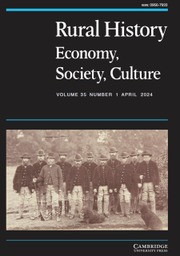Tradition and Exclusion: Parochial Officeholding in Early Modern England, A Case Study from North Norfolk, 1580–1640
Published online by Cambridge University Press: 17 March 2004
Abstract
This article suggests that there has been a tendency to understate the degree to which officeholding during the early modern period was embedded within the community, moulded by local influences and fulfilling a range of different functions in the parish. An over-emphasis upon national processes of social and cultural change has resulted in a failure to appreciate the complexity of the politics of officeholding. There has been only limited recognition of both the presence of constraints upon the actions of parochial elites and the mechanisms through which particular groups established and maintained control over parochial institutions. A detailed analysis of officeholding within seven parishes lying on the north Norfolk coast stresses the extent to which ‘parochial traditions’ determined the way in which things were done. It is argued that the effective linkage of officeholding to these shared understandings and to ideals of participation and inclusion created a powerful rhetoric through which the exclusion of a large minority of the populace and uneven distributions of officeholding were justified.
- Type
- Research Article
- Information
- Copyright
- © 2004 Cambridge University Press
Footnotes
- 4
- Cited by




